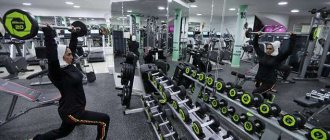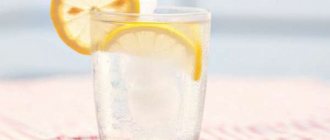Does water prevent you from losing weight?
Losing weight is about losing fat, not water. Yes, by losing fluid during exercise, you can lose 500g or even 1kg of weight and be happy when you look at the scale. But as soon as you drink, the lost grams will return, and the fat will remain the same.
The only reason to remove water from the body is to lose weight before a competition.
Athletes do this to enter the desired weight category. But we must understand that their ultimate goal is body weight, and not appearance, and certainly not long-term changes.
As for real weight loss, when fat goes away and the body becomes slimmer and healthier, water is simply necessary. It increases Water‑induced thermogenesis. calorie consumption, reduces Effect of excessive water intake on body weight, body mass index, body fat, and appetite of overweight female participants. appetite and helps Drinking water is associated with weight loss in overweight dieting women independent of diet and activity. lose extra pounds even without dieting.
Plus, if you're losing weight, the main goal of working out is to burn more calories. To do this, you have to give it your all, and for that you also need water.
About sports fashion
Nowadays, smoking, drinking large quantities of alcohol, being sick, and earning little has simply become unfashionable.
Now, in addition to the fashion for gadgets, clothes and high incomes, there is a fashion for good sportswear, a toned figure, and correct posture. It is difficult to find a magazine that does not contain information about various diets and sports training. An athletic figure is considered the standard of beauty. As a result, the number of fitness clubs and sports sections in the country is growing. The issues of training high-class athletes are resolved at the government level. And at the local government level - the availability of children's sports complexes on playgrounds in courtyards. While a person is young intellectually and physically, as long as he is healthy, he is more valuable on any competitive platform, especially if life experience has provided a high level of professionalism. And modern reality is much stricter about who can do their job more professionally.
We are already witnesses to the fact that even at the age of 60, many famous figures start new families, give birth to children, create and multiply businesses. A certain standard of modern aging has emerged. This was simply impossible in the very recent past. Maintaining your health in our time is possible, including through competent exercise, giving up bad habits and, in general, thanks to a conscious approach to your health.
On the importance of water consumption during physical activity
On our website dedicated to water and water treatment, we cannot ignore the issue of the importance of water consumption during physical activity. First of all, we will talk about the consumption of drinking water during sports activities, as well as the drinking regime of those whose professional activities involve physical labor.
The issue of water consumption during high physical activity, primarily cyclic and interval, raises many questions and debates both among athletes and athletes, and among doctors. With sweat and intense breathing, the body loses a lot of moisture, but on the other hand, when fat is broken down, water is produced, thereby partially compensating for fluid loss. The question of specific water consumption is individual. If there is a lack of water during sports, the blood thickens, it transfers oxygen to working muscles worse, it becomes more difficult to remove waste products from the muscles, and energy losses for heat removal increase significantly. Also, blood pressure seriously increases and there is no loss of fat deposits, since due to lack of fluid they are simply not included in the process of energy supply to the athlete’s working muscles. However, water consumed between approaches to the exercise relaxes the working muscles, its excess leads to a feeling of heaviness in the stomach, and increases general fatigue. Conclusion - you need to drink, but you need to know the norm. It is better to drink more often and in small portions, not too much, so that the feeling of dry mouth disappears.
Does water help you train better and more?
Your muscles are 75% Healthy Hydration water. It is involved in the functioning of every cell in your body, in the chemical processes of producing energy, moving nutrients and removing waste. It's not surprising that a deficiency of such an important component will impact your productivity.
Losing just 2% of water reduces your workout results by 25%.
During physical activity, you lose fluid at an accelerated rate through breathing and sweat. Dehydration causes rapid fatigue and loss of coordination. Lack of water prevents your body from effectively cooling itself, so you may get heatstroke, especially if you exercise in a hot environment.
At the same time, it is difficult for a person to determine the mild degree of dehydration when productivity is already declining, but there is still no strong thirst. Even experienced track and field athletes underestimate Water Tips for Efficient Exercise the loss of fluid through sweat by 46%, and when preparing for competitions, athletes are often dehydrated before the first workout begins.
As a result, their heart rate and body temperature increase, the use of muscle glycogen instead of fat increases, and cardiac output—the amount of blood that the heart can pump out at one time—decreases. As a result, athletes lose focus and alertness, can sustain fewer maximal power movements, and become fatigued more quickly.
And all this can be corrected simply by adjusting the drinking regime.
As you can see, consuming water during training is not only possible, but necessary. This liquid is beneficial for both athletic performance and weight loss.
Can you drink water while exercising?
Some fitness enthusiasts choose to refrain from drinking water during workouts, believing that this will help them lose weight faster. In addition, they “mercilessly” test their body’s resistance to dehydration even in their free time from fitness. For example, for a greater “effect” of fat burning, they often visit baths, saunas and consume various diuretics. The result, of course, is - 1-2 kilograms are lost along with water and sweat. But is this method effective and, most importantly, safe?
Refusal of water during training, frequent visits to the steam room or abuse of dehydrating drinks does not lead to the cherished goal of losing extra pounds, but to disruption of the functioning of various body systems. During intense exercise, our body loses a huge amount of moisture, as a result of which the blood thickens, the blood flow slows down, and the nutrition of tissues and cells deteriorates. The result is shortness of breath, blood clots, weakness, dizziness, etc.
- 222 222
More details - 162 162
More details
- 312 312
More details
- 182 182
More details
If you do not replenish the loss of water in the body, you can expect serious diseases in the future:
- Premature aging, dullness and dryness of the skin, the appearance of wrinkles.
- Low body tone, stress.
- Forgetfulness and the development of atherosclerosis.
- Decreased immunity.
- Problems with the gastrointestinal tract - constipation, diarrhea.
- Chronic joint pain.
Think about it, is losing weight worth such risks? Despite the fact that the lost kilograms with water during fitness will quickly return. This is clearly not the best option, and certainly not the safest.
There are other ways to fight excess weight, much more effective:
- Reduce the consumption of salt and alcoholic products - they block the removal of fluid from the body.
- Eat less sweets and sugar - foods provoke thirst.
- Include potassium-rich foods in your daily diet. They remove fluid.
Also remember this fact - dehydration directly contributes to the development of obesity. If a person limits himself in water consumption, then over time the body will begin to confuse thirst with hunger. As a result, a person will only eat more when he should have just drunk a glass of water.
How to drink during physical activity
The general recommendation for Healthy Hydration is very simple:
- 500–550 ml of water two hours before the start of training.
- 200–300 ml of water every 10–20 minutes during training.
- 450–650 ml of water for every 0.5 kg lost during training.
Simplifying it even further, it looks like this:
Before training - a 0.5 liter bottle, during training - a glass of water every 15 minutes, after training - drink as much weight as you lost.
If you don't feel comfortable carrying a bottle while jogging in the park, for example, at least drink before and after your run. But when you sweat on the machines or in the fitness room, water should become your faithful companion in the world of physical activity.
After training
The peculiarities of the body are that loss of fluid immediately provokes swelling.
This is due to the fact that it tries to compensate for the lack of moisture by preserving the remaining water. Thus, the loss of water and its failure to replenish it is fraught with disruption of metabolic processes and the appearance of edema, and this does not contribute to the breakdown of subcutaneous fat. Therefore, lack of water negates all the efforts made during training.
Maintaining water balance after a workout also plays an equally important role.
Why should you drink after a workout?
Water is the main transporter of oxygen; it is responsible for the functioning of cells and the vital activity of tissues. You can not only drink water after a workout, but you also need it, regardless of the goal being achieved. Both a person losing weight and one building muscle mass must competently build a drinking diet.
During training, profuse sweating occurs, the lack of water must be replenished, otherwise the fat burning process will be inhibited. The greatest effectiveness from cardio training and strength exercises can be obtained only by maintaining a water regime. Weight training should also be supplemented with water to avoid muscular dystrophy, which can prevent not only muscle growth, but also harm your health in general. Don't forget about possible overheating and dehydration.
You should not deprive your body of water after exercise, as this can lead to thickening of the blood and lowering blood pressure. More serious consequences include the formation of kidney stones and fainting.
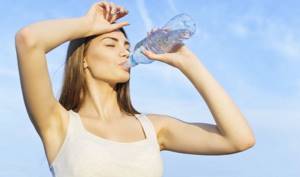
Tip: water consumption is not affected by the type of physical activity - whether a person does yoga, bodybuilding or cardio equipment.
How soon can you drink?
You can start drinking water immediately after training. You can drink the first glass in small sips, slowly. The remaining required amount of water is drunk over the next hour.
It should be taken into account that it is strictly forbidden to deny the body water after playing sports.
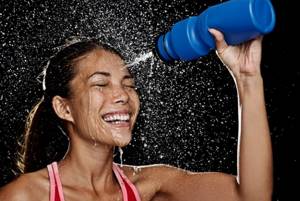
How much water to drink?
The volume that you can drink after training is determined by the amount of fluid consumed during exercise in the gym. To determine this mass, you should spend the day as follows:
- calculate (based on data on weight and physical activity) the required daily water requirement and try to stick to it throughout the day, consuming water evenly;
- weigh yourself before training;
- Drink no more than 2 glasses of water during training;
- After training, weigh yourself again;
- the difference that will be revealed in the indicators before and after training will be the volume that needs to be replenished.
After training, you can drink no more than a liter of water, depending on the volume of your stomach. It is recommended to distribute the entire water mass in this way: drink a glass of water within the first 5 minutes, and the rest only after 20 minutes.

What kind of water can I use?
Immediately after the end of the workout, you can drink only clean water without gas; it should also be filtered and without additives. Carbonated water causes bloating, sugar added to water increases the load on the heart, and salt prevents the removal of excess fluid, contributing to the deposition of extra pounds.
After 20 minutes after training, you can drink water with lemon - it starts metabolic processes and better quenches thirst. Coconut water also falls into this category - it is also healthy and has a beneficial effect on metabolism. During the same time period, you can drink mineral water, but without gas. The water temperature should be room temperature.
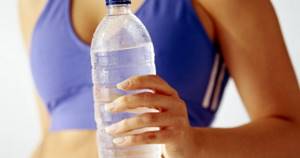
Tip: The time of year affects fluid intake - in summer, dehydration occurs faster; in winter, the rate of evaporation of water from the body also increases.
To drink or not
Some argue that drinking water during exercise is strictly prohibited. As arguments, the opinion is given that it “accelerates” lactic acid and does not allow the muscles to be properly worked, which become “wooden” and can no longer bear the load. However, no studies have ever confirmed this theory. On the contrary, Dutch scientists have calculated that a loss of 5% of moisture reduces the effectiveness of training by 30%. What does this mean? Only that the question “Can I drink during training?” There is only one answer - positive.
Why is water important during exercise?
From maintaining optimal water balance
The result of training depends on the athlete's body. During active exercise, active sweating occurs, which protects the body from overheating, but leads to fluid loss.
Why drink water in the gym? Here are the most important arguments:
- With a lack of water in the body, all systems that are responsible for maintaining optimal body temperature, removing metabolic products, and smooth joints experience discomfort. This leads to a deterioration in the athlete’s well-being and a decrease in his productivity;
- With dehydration, even slight, the blood thickens, which puts a high load on the heart: it becomes much more difficult for this organ to pass thick liquid through itself and distribute it throughout the body;
- The metabolic rate is determined by the water balance in the body: the more fluid, the easier and faster the elimination of toxins and metabolic products. Lack of water is a direct way to slow down your metabolism, which will not allow you to achieve the desired improvements in your figure.
The need to drink water if you become dehydrated during exercise
If a person is thirsty, this means that dehydration has already occurred. When a little time has passed since the desire to drink water appeared, the degree of dehydration is still small. At this moment, you need to compensate for the lack of moisture by drinking water. Sometimes people do not do this, which affects the amount of electrolytes in the body and leads to various disorders.
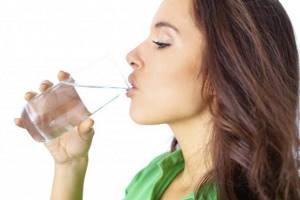
When the volume of blood in constant circulation decreases, renin is produced, which affects the blood vessels, increasing their tone. As a result, they narrow, which causes an increase in blood pressure. Vascular pressure should be at the same level, so all processes in the body are aimed at maintaining it. Water is released from various cells and sent to the main vessels. This allows for normal blood supply to vital organs.
The role of water in the training process
During exercise, your body temperature rises and your body secretes sweat to regulate thermoregulation. Together with sweat, not only harmful metabolic products are removed, but also salts and minerals that the body needs.
During training, you need to constantly drink water in small sips to avoid dehydration. Losing 1-2% of body weight due to fluid is already dehydration. If you feel thirsty during training, then your water reserves are greatly depleted. Your goal is to prevent yourself from feeling thirsty. That is why during training you need to drink water not when your mouth is already dry, drinking half a liter at once, but regularly replenish fluid loss every 10-15 minutes.
Drinking water throughout the day
There are also some recommendations on how to properly drink water throughout the day. So, it is recommended to drink a glass of clean water immediately after waking up. This will not only supply the body with fluid, but will also contribute to better cleansing of the intestines. Just this one step - a glass of water after waking up - can take your health to a whole new level. Simple, like everything ingenious! But before going to bed, you need to limit the amount of fluid you drink to reduce the load on your kidneys. During the day, be sure to drink whenever you feel the slightest sign of thirst. And try to drink not tea or coffee, but clean water.
What kind of water to drink
Even in a normal state, when a person is not training, he definitely needs to drink water. We will also answer one of the most popular questions: “what kind of water to drink - boiled or raw?” It is better if it is clean raw water.
In a world where there is a constant problem with the environment, you need to take care of your health and drink bottled water from reputable manufacturers. Such water goes through different stages of purification, passing through special filters, but at the same time, does not lose its beneficial properties. It would seem, what benefit can there be from plain water? Very big. Many ancient cultures prohibited people from settling in places where there were no clean springs. In the modern world, most people cannot afford to live near a source. Therefore, you have to use water from the tap or from bottles. So let it be clean! Should I drink other drinks? Of course, but they should not replace regular water, especially during training.




